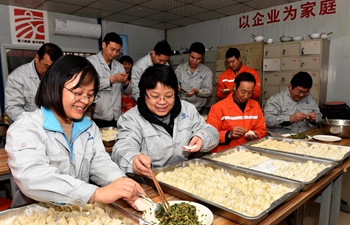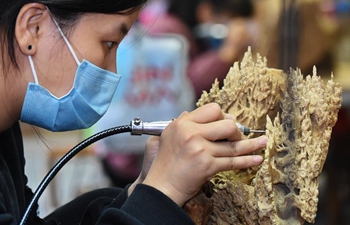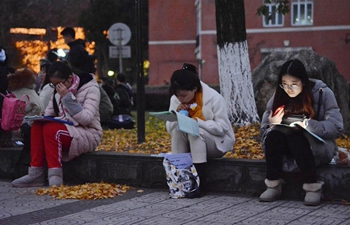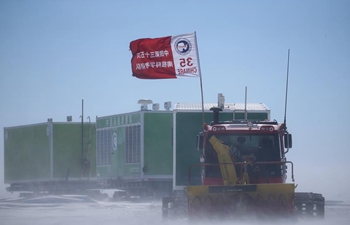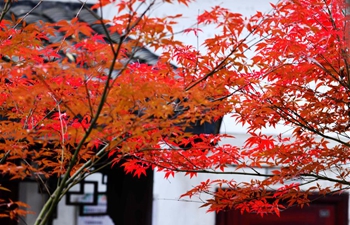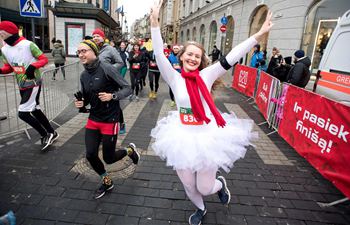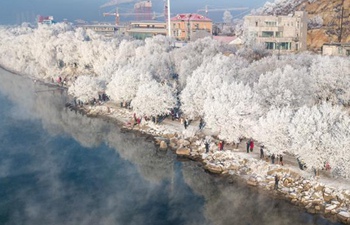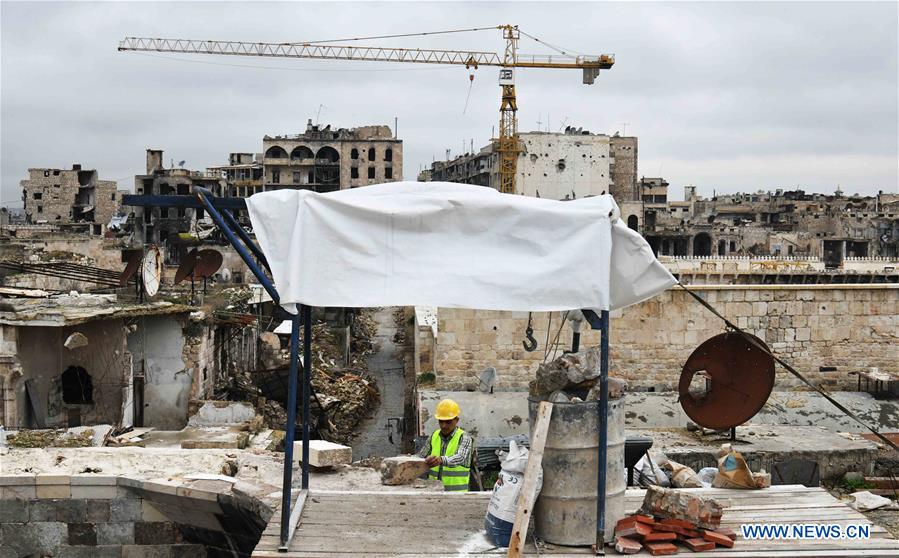
A Syrian worker fixes the roof of the covered Souk al-Saqatiyya in Aleppo, northern Syria, on Dec. 19, 2018. In Syria's northern Aleppo city, the determination of the residents to rebuild their lives and city is stronger than the massive destruction that has befallen them. Two years since its liberation, people have already rolled up their sleeves and started fixing the destruction in the ancient walled marketplace in the city, not discouraged by the devastation. (Xinhua/Ammar Safarjalani)
by Hummam Sheikh Ali
ALEPPO, Syria, Dec. 22 (Xinhua) -- In Syria's northern Aleppo city, the determination of the residents to rebuild their lives and city is stronger than the massive destruction that has befallen them.
Two years since its liberation, people have already rolled up their sleeves and started fixing the destruction in the ancient walled marketplace in the city, not discouraged by the devastation.
For Xinhua reporters, in every visit to Aleppo they see something new: squares that are fixed, shops that returned to life, souks getting repaired, some houses that are still damaged but its residents fixed them enough to return, holiday decorations and many more.
It's a sign that the people of Aleppo are truly hard workers, and this trait has for long been known about them even before the war.
This time, the rehabilitation process is underway in the Souk al-Saqatiyya, one stretch of the covered souks of Aleppo, which are around 15 square km in the formerly rebel-held eastern part of the city.
The covered souks in Aleppo are a UNESCO world heritage site that dates back to the 14th century.
Workers inside al-Saqatiyya Souk were actively moving and repairing, as they have finished fixing a small part of that souk since last month as the entire project of fixing the 100-meter-long al-Saqatiyaa souk is expected to take seven more months.
Basel al-Zaher, an engineer and the contractor supervising the project, told Xinhua that working on ancient souks needs time and precision as they are not contemporary buildings.
He said that they are trying to rebuild the destroyed parts from the original rocks that fell during the war, noting that the workers are even trying to fix the old blocks so that they could be used again.
Al-Zaher said that before the war and throughout the years, people and shop owners had somehow violated the ancient structure of the souks in general with paintings and extra decoration.
The workers are now trying to restore the shops to their original shapes and reveal the original rocks that have been covered with several layers of paintings during the years.
"We are doing not restoration only for the stones; we are making the restoration for our lifestyle we wanted back again before the war ... we hope it will be like before," he told Xinhua.
Outside the old gates of the souk, a man was sitting on a chair and selling meat sandwiches from a stall in front of him.
When asked why he would be staying here amid the ruins, he said that he owns a shop that is being fixed in al-Saqatyyia.
"Even though I cannot return to my shop now, I have already started working and I am waiting at the gates of the souk. So when my shop is fixed, I could be so close to run back to it," he said, while grilling meat and filling the surrounding with a delicious smell.
That was the case in al-Saqatiyaa, where shop owners, who used to sell meat and groceries, are waiting for the reparation to be done so that they could return.
In another part of the old souks of Aleppo, some people have already returned to their shops in the Al-Nahhasin Souk, a marketplace specialized in selling handmade copper products, such as vessels, kettles, lamps, and chandeliers.
Around 10 shops have so far opened in that souk since the army captured the eastern part of Aleppo in December of 2016. Despite the fact that many shops are still closed, the knocking on copper, the sound of radio and chat of people in the opened shops have lent that place a sense of a long-missed life.
Around it, cars horns and bicycles could be heard and seen, and people were the life that streamed back to these places and is helping it rise up from the devastation of war.
Ahmad Ghazoul, a coppersmith, has returned two months ago after he managed to do some reparation to his shop, which took him six months to finish on his own.
"When we returned we found that the terrorists had left us nothing, all in ruins. Thankfully, the government has helped us clean the roads of debris and offered many facilitations for us," he said.
The man said that he and others are starting their lives from scratch and they have managed to overcome the shock and start over.
"As long as there are hope and faith in this country, we will be able to return and to develop," he said.
His neighbor, Khaled Hammoud, said he was the first to return to his shop and encouraged several people to return as well.
"We hope that more people would come to open their shops here ... I hope that this souk would become even better than it was," he told Xinhua.
Surely, the overall reconstruction in Aleppo would take years and need billions of U.S. dollars, but the aforementioned were examples of how people are working their hearts out to win their lives back and restore the glamor to Aleppo, once the economic capital of Syria, to the best of their ability.




